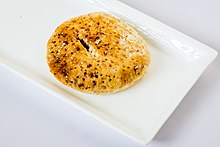Bakarkhani
Dhaka, Bangladesh. They can be seen lining the walls of the tandoor oven. | |
| Alternative names | Shukha |
|---|---|
| Type | Bread |
| Course | Appetizer/Dessert |
| Place of origin | Bangladesh |
| Region or state | Dhaka, Chittagong |
| Associated cuisine | Bangladesh,[1] India[2] and Pakistan[3] |
| Main ingredients | Dough, ghee, milk, sugar (optional) |
| Variations | Gao-joban, Shuki (shukha), Nimshuki, Kaicha-ruti, Mulam, Chinshuki, Kashmiri |
Bakarkhani or Baqarkhani or Bakorkhoni also known as bakarkhani roti, is a thick, spiced
Bakorkhani is almost
Legend

A legend attributes the bread's name to
The
Regions
Bakarkhani is popular in the regions of Pakistan,[4] India,[13] Bangladesh, Afghanistan and Russia.[14]
Utsa Ray, a culinary historian, described Bakarkhani as the "pride" of the "gastronomic culture of Dhaka"[15] and according to other scholars, "Bakorkhoni gives Old Dhaka a unique and distinct culinary identity".[16] According to Hakim Habibur Rahman, Bakorkhoni could not be found in anywhere else than Dhaka during the colonial period.[15]
Preparation

Bakorkhani is made by kneading together flour, ghee, in some cases cardamom, sugar and salt with water. The dough is then flattened. The bread is made by stretching a sheet of dough repeatedly and interleaving with ghee, molasses, saffron water, poppy or nigella seeds before baking on a tandoor or tawa girdle.
Variations

It is also known as shukha (meaning 'dry') naan or shukha roti due to its dry texture.[6] Hakim Habibur Rahman, author of Dhaka Panchas Baras Pahle, lists three variations of bakorkhani; Gao-joban, shuki (shukha) and nimshuki. There are also other variations such as kaicha-ruti, mulam and chinshuki.[7]
Outside of Dhaka, different types of Bakarkhani are eaten across the country. The Bakarkhani of Sylhet and Chittagong resemble a sweet and syrupy porota,[17] whilst the Bakarkhani of Dinajpur is thick and doughy and often contains pieces of morobba.[18]
There is also a
In literature

Bakorkhani is mentioned in lines of a Bengali poem by Pratul Mukhopadhyay:
‘আলু বেচো, ছোলা বেচো, বেচো বাকরখানি |
Sell potatoes, sell gram, sell Bakarkhani |
| —Pratul Mukhopadhyay |
See also
- List of Indian breads
- List of Pakistani breads
References
- ^ Akbar, Ahsan (21 March 2021). "From kala bhuna to shatkora curry – let's all get a taste for Bangladesh". The Guardian. Retrieved 7 October 2021.
- ISBN 9788170230069..
A rare leavened Indian bread, Bakarkhani is a popular with the Muslims of the Deccan
- ^ Sumayya Usmani (2017). Mountain Berries and Desert Spice: Sweet Inspiration From the Hunza Valley to the Arabian Sea. Frances Lincoln. p. 51.
- ^ a b "This sweet flatbread is in fact a Mughal recipe". Dawn. 2 February 2016.
- ^ Shinwari, Sher Alam. "Local pizza, Bakorkhani bread gaining popularity". Dawn. Pakistan. Retrieved 24 February 2020.
- ^ ISBN 984-412-104-3.
- ^ OL 30677644M. Retrieved 25 April 2024.
- ^ Nazir Hussain (April 1995). Kingbodontir Dhaka (Edition 3). Dhaka: 3 Star Cooperative Multipurpose Society Ltd. p. 293.
- ^ "Bakorkhani: delight in every bite". Daily Sun. Retrieved 5 May 2018.
- ^ Prothom Alo, Chhutir Dine, 4 February 2006
- ^ Muhammad Abu Talib (28 February 2015). ঐতিহ্যের বাকরখানি যাচ্ছে বিদেশে [Traditional bakarkhani is going abroad]. The Daily Ittefaq (in Bengali).
- ^ Katti, Madhuri (14 March 2019). "Bakorkhani: An Ode To Lost Love". Live History India. Archived from the original on 1 July 2019. Retrieved 1 July 2019.
- ISBN 9780313324871.
- ^ "Bakarkhani: delight in every bite". Daily Sun. 24 April 2016.
- ^ ISBN 978-1-107-04281-0.
- ISBN 978-0-12-820012-4.
- ^ "Sylhety Bakharkhani". khadizaskitchen.com. Retrieved 29 April 2020.
- ^ "Bakarkhani: delight in every bite". Daily Sun (Bangladesh). 24 April 2016. Retrieved 29 April 2020.
- ^ Afreen, Saima (6 December 2014). "Bakorkhani, only a sweet memory now". The Times of India. Retrieved 24 February 2020.
- ^ "Culture of Anantnag". District Anantnag J&K. Archived from the original on 19 June 2009.
- ^ "Kashmir has special confectionary". Thaindian News. 13 March 2008. Archived from the original on 12 May 2018. Retrieved 18 July 2013.
- ^ ঐহিত্যবাহী বাখরখানির ইতিহাস [Traditional Bakarkhani history]. Natun Barta (in Bengali). 25 July 2020. Archived from the original on 6 October 2021. Retrieved 6 October 2021.
